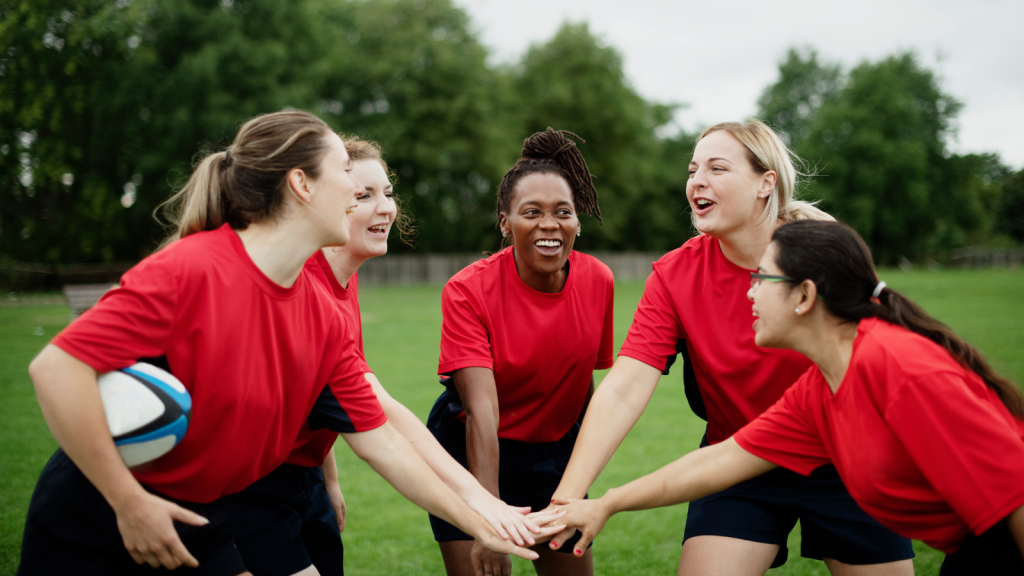
A recent study found that girls and women are less likely to engage in regular physical activity than boys and men across Wales. But what role does menstruation play in this? Dr Kelly Morgan co-organised a recent workshop to find out more

Women’s health is currently under the spotlight, with governments and research funders calling for a need to produce more research to support women. The Welsh Government has produced a document called The Quality Statement for women and girls’ health and within with this, the government pledges to promote equity and inclusion in health and social care. A key part of this document focuses on younger females and understanding how best we can support girls’ wellbeing throughout their time at school. For example, puberty can bring about lots of changes both physically and mentally and it is often a challenging time for young people.
Recent data from the Sport Wales survey showed that girls and women are less likely to engage in regular physical activity than boys and men across Wales (Sport Wales., 2024). This picture has been the same for many years. Understanding what is causing these lower levels of physical activity is vital to supporting girls and women so they too may benefit from being physically active.
Getting together
On June 4th 2024, we held a workshop with 25 attendees to discuss the topic of physical activity for girls, with a focus around menstruation. Led by Dr Lauren Copeland (at the Centre for Health, Activity and Wellbeing Research, Cardiff Metropolitan University) and supported by myself and four others (Dr Christine McKnight, Dr Alison Cooper, Dr Sarah Brown, and Dr Robyn Jackowich), we spent the afternoon with members of the public, representatives from charities, other academics and members from sporting organisations.
“I’m honoured to be playing a part in such vital research that will help facilitate healthy lives and equitable support for people who have periods. Having public involvement ensures this process stays as relevant as possible, creating true change for the better.”
Molly Fenton, founder of the ‘Love Your Period’ campaign
The workshop began with a presentation of some of the ongoing related work in Wales. This included an overview of:-

Early findings from a study which is reviewing strategies around how we might tackle period poverty.

A current study which is looking at all the existing literature around the impact of menstruation on physical activity participation.

A study exploring men’s knowledge of menstruation and awareness of how menstruation can impact physical activity levels.
Moving forward
Next, all workshop attendees were encouraged to think about future priorities for further research and policy action. Following small group discussions and sharing of views among the whole room, the following areas were identified as key:

The importance of including the public: Ensuring both public and patients are given the opportunity to be involved in research from the very beginning to consider the lived experience across diverse populations and ensure the research being carried out was most relevant.

The role of education: Considering the wider support systems around people who experience periods (e.g., the curriculum, male peers, sports coaches etc) to ensure there is awareness and knowledge of reproductive health and strategies to support people who menstruate to manage their periods and wider related-health experiences.

The surrounding environment: Ensuring safe, hygienic and private areas are available at all schools and sporting locations, with consideration for availability and access to free period products and disposable outlets. This also concerned the availability of suitable school kit for physical education and extra-curricular activities as this might influence participation in physical activity.

Physical impacts: Understanding the impacts of periods on physical activity and sport performance and what coping strategies are currently used or could be considered to continue being physically active while menstruating.
Shared experiences
In addition to the key areas above, attendees shared personal stories regarding their related roles or lived experience with menstruation. As part of this, we learned about the reusable period products which are currently being designed and provided for those living in the poorest parts of the world. We heard from Molly Fenton, who has battled with menstruation growing up and is now a leading spokesperson for a menstruation charity Love Your Period, volunteering her time to help others. We heard about the challenges of the new school environment with gender neutral toilet facilities being introduced and the challenges this was bringing for those menstruating.
The workshop concluded with many great being ideas shared and new connections formed with an eye to lots of collaboration for exciting future work. A short summary report of the afternoon was also provided for all attendees.
What next?
We plan to continue building our networks, complete the ongoing work and importantly move the key identified areas forward. As an example, at Cardiff University, the School Health Research Network (SHRN) team is now working with primary schools to understand the menstruation needs of younger people and what current practices exist to support learners in schools.
The workshop was funded by a Cardiff Metropolitan Innovation Small Grant award.
Workshop organisers:-
Cardiff Metropolitan University: Dr Lauren Copeland, Dr Christine McKnight and Dr Sarah Brown
Cardiff University: Dr Kelly Morgan, Dr Alison Cooper and Dr Robyn Jackowich
Dr Kelly Morgan is a Senior Research Fellow at DECIPHer and Deputy Director of the School Health Research Network. She is particularly interested in the development and evaluation of complex interventions aimed at increasing physical activity, improving dietary behaviours and mental health outcomes.

